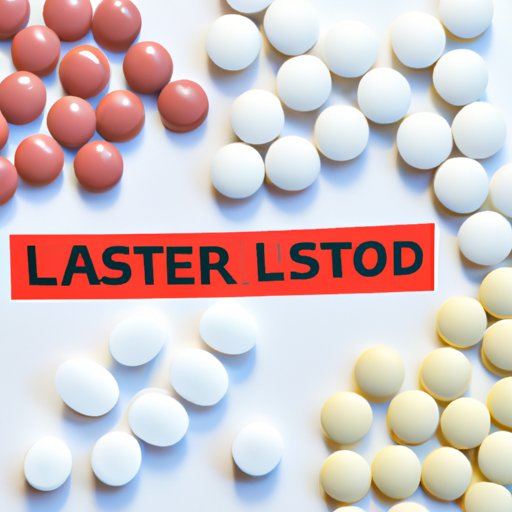
Introduction
If you have high cholesterol levels, you are not alone. High cholesterol levels affect millions of people around the world. High cholesterol levels increase the risk of heart disease, which is responsible for a significant number of deaths globally. Cholesterol-lowering medications are used to prevent heart disease by reducing cholesterol levels. This article aims to provide a comprehensive guide to understanding how cholesterol medicine works.
A step-by-step guide to understanding cholesterol-lowering medicines
Cholesterol is a waxy, fat-like substance produced by the liver that is essential for our body’s functioning. Cholesterol plays various roles in our body, such as building cell walls, producing hormones, and helping digest food. However, if there is too much cholesterol in your bloodstream, it can accumulate on the walls of your arteries, leading to atherosclerosis, plaque buildup, and an increased risk of heart disease.
Cholesterol-lowering medication aims to lower the cholesterol levels in your bloodstream. These medications work in different ways, some of which include.
Cholesterol medicine and how it affects our body’s systems
Cholesterol medication works on different systems within the body to reduce the level of cholesterol. Some of these medications work by inhibiting the liver’s production of cholesterol, while others work by increasing the transfer of cholesterol from the bloodstream to the liver, where it is eliminated from the body.
Cholesterol-lowering medications can have various side effects, and some of these side effects can depend on the type of medication being used. Some of the common side effects of cholesterol-lowering medicines include muscle pain, joint pain, and liver damage.
What are the different types of cholesterol medicines, and how they work
There are several classes of cholesterol-lowering medications, and each works in a slightly different way. Some of the most common classes of cholesterol-lowering medications include:
- Statins
- Bile Acid Sequestrants
- Niacin
- Ezetimibe
- PCSK9 inhibitors
Statins are the most common type of cholesterol-lowering medication. They work by blocking the liver’s production of cholesterol, which, in turn, lowers the overall cholesterol level in the bloodstream.
An in-depth analysis of the mechanism behind the most common cholesterol medicines
The most common cholesterol-lowering medication is Statin. Statins work by inhibiting the HMG-CoA reductase enzyme, which plays a crucial role in cholesterol production in the liver. By reducing the activity of this enzyme, the liver produces less cholesterol, and there is a reduction in blood cholesterol levels.
Another cholesterol-lowering medication is PCSK9 inhibitors. These medications work to remove LDL cholesterol from the bloodstream by enhancing the liver’s ability to eliminate it. PCSK9 inhibitors bind to PCSK9, a protein that reduces the liver’s ability to eliminate cholesterol, and enhance the liver’s ability to eliminate LDL cholesterol from the bloodstream. These medications are often used in conjunction with Statins.
How does cholesterol medicine work to prevent heart attacks and strokes?
High cholesterol levels are a significant risk factor for heart disease. Cholesterol medication works to reduce cholesterol levels, which, in turn, reduces the risk of heart disease. By lowering LDL cholesterol levels, cholesterol-lowering medication can lower the incidence of heart attacks and strokes. Statins, in particular, have been shown to significantly reduce the risk of heart attacks and strokes in individuals with high cholesterol levels.
Understanding the side effects of cholesterol medication and its benefits
Cholesterol medication has several benefits, including reducing the risk of heart disease and stroke. However, they also have several potential side effects. Some of the common side effects of cholesterol medication include liver damage, muscle pain, and joint pain. Most cholesterol-lowering medications require monitoring for potential side effects, and it is essential to discuss with your doctor the best course of action when considering cholesterol-lowering medication.
Do we still need to change our dietary and lifestyle habits while on cholesterol medicine?
Lifestyle changes, including a healthy diet and regular exercise, are essential for maintaining healthy cholesterol levels. While cholesterol-lowering medications work to reduce cholesterol levels, they cannot replace healthy lifestyle changes. In general, a healthy diet and exercise can help lower your blood pressure, improve your cholesterol levels, and reduce the risk of heart disease.
Conclusion
Cholesterol-lowering medication has been effective in reducing the incidence of heart attacks and strokes in individuals with high cholesterol levels. It is essential to understand how cholesterol medication works, including its side effects and benefits. By discussing with your doctor and implementing healthy lifestyle changes, you can take control of your cholesterol levels and improve your overall health.





